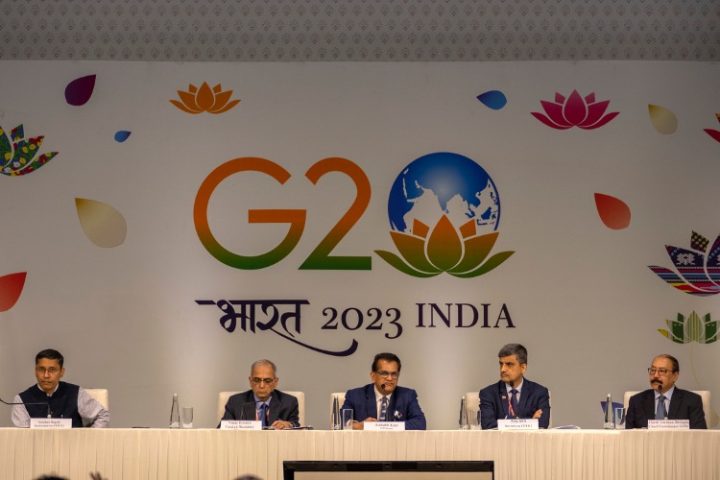
Leaders of the G20 group of advanced economies have decided to accept the African Union (AU) as a permanent member in the organization, based on various media reports before this week’s summit in New Delhi.
The grouping of 55 African countries, which is presently regarded as an “invited international organization” by the G20, would enjoy the same status as the European Union within the G20.
The G20, a grouping of the world’s largest economies — contributing to about 85 percent of global GDP and more than 75 percent of global trade — currently consists of 19 countries (Argentina, Australia, Brazil, Canada, China, France, Germany, India, Indonesia, Italy, Japan, South Korea, Mexico, Russia, Saudi Arabia, South Africa, Turkey, the United States, and U.K.) and the EU.
Indian Prime Minister Narendra Modi, whose nation is chairing the rotating G20 presidency at the moment, supposedly encouraged other leaders to welcome the African Union into the group in a letter in June.
“This will be a right step towards a just, fair, more inclusive and representative global architecture and governance,” the media cited Modi’s letter as saying. “[The] prime minister is a strong believer in having a greater voice of the Global South countries on international platforms, particularly of African countries.”
South Africa is currently the only permanent G20 member representing Africa. Egypt and Mauritius are “invitees.”
The AU’s impending accession was verified by The Times of India, Bloomberg, and Russia’s Vedomosti daily. The latter quoted Svetlana Lukash, a Russian G20 sherpa, as its source. Lukash pointed out that Moscow was among the first to back the candidacy after it was formally tabled last year by President of Senegal Macky Sall, who was the chair of the African Union at the time.
The Senegalese dignitary contended previously this year that the G20 would reverse a great “injustice” by welcoming the AU into its ranks. African nations collectively rank eighth place in the world in terms of GDP, he said, addressing his audience during an economic event in France.
Bloomberg said the United States and its European allies intend to use the G20 leaders’ summit in India, which is scheduled for this weekend, to woo nations that have good relations with Moscow and Beijing. Russian President Vladimir Putin and China’s Xi Jinping will not be attending in person.
The Europeans especially view their backing of the AU’s bid as granting them influence among the nations of the continent, Bloomberg explained.
Thus, Bloomberg cited sources saying that the EU plans to support the AU’s bid to become a permanent member of the G20.
With Russian President Vladimir Putin and Chinese President Xi Jinping both declaring that they were not attending the G20 summit in person, Brussels would try “to seize the moment … to show that it is serious about redefining its partnership with Africa, despite the troubled legacy of colonialism,” Bloomberg alleged in a report on Tuesday.
According to sources cited by the news outlet, G20 officials are intending to conduct a “mini-summit” with the AU on the fringes of the G20 event on September 9, the first day of the two-day gathering.
Additionally, the sources stated that European Commission President Ursula von der Leyen, European Council President Charles Michel, and German Chancellor Olaf Scholz will be among those representing the EU at the gathering.
African participants will supposedly entail South African President Cyril Ramaphosa together with the leaders of Egypt, Nigeria, and Comoros, which is presently chairing the AU.
Supporting the AU’s bid to become a permanent G20 member is regarded in Brussels as one of the key aims of the “mini-summit,” the sources said.
Permanent membership — rather than its current status as an “invited international organization” — would put the AU on the same level as the EU within the G20. The AU membership would then provide Africa “a stronger voice” in decisions by global organizations that impact the continent, Bloomberg indicated.
Russia also endorsed the move to let the AU become a member of the G20, with Foreign Minister Sergey Lavrov divulging in June that such a situation would materialize soon, and “with active backing” from Moscow.
Other topics to be discussed during the “mini-summit” in New Delhi include the ramifications of the Ukrainian conflict on global food security, global financial architectural overhauls, enhancement of investment conditions in Africa, as well as the situation in the Sahel region, based on Bloomberg’s sources.
In recent months, Russia and China have been proactively bolstering diplomatic and economic relations with Africa. The BRICS summit in Johannesburg in July concluded by welcoming two African nations — Egypt and Ethiopia — among six new member states to officially join BRICS from January 2024.
In July, a high-profile Russia-Africa Summit was held in St. Petersburg, at which host Putin said that both ends had agreed to set up “a permanent mechanism” to work together on security matters, food security, information technology, and other issues. Russia and Africa also hope to “combat neo-colonialism, the practice of applying illegitimate sanctions, and attempts to undermine traditional moral values,” the Russian president elaborated.
Prior to the G20 event, Modi declared that India’s presidency in the G20 was proof of India’s rising global role. Once deemed as only a huge consumer market, India is now regarded as a global player able to combat challenges ranging from Covid-19 to bigger humanitarian crises, the Indian leader stated in an interview with the PTI news agency.
Furthermore, Modi cautioned against “irresponsible” financial policies and called for a firm commitment to financial discipline, pointing out that while populist measures may garner short-term political gains, they might lead to deleterious long-term social and economic consequences.
Modi’s remarks came as he referenced the global debt crisis, which he admitted was a major concern, especially for developing nations. The Indian leader pointed out that he had encouraged state governments to focus on financial responsibility, acknowledging that resilient financial policies were vital for a nation’s growth and stability.
Ominously alluding to a “new world order,” Modi added, “Like a new world order was seen after World War II, a new world order is taking shape post-Covid. The parameters of influence and impact are changing and this needs to be recognized.” Modi claimed that New Delhi’s “Sabka Saath Sabka Vikas” model, which means “development for all,” has shown the way in India and can also be a guiding principle for the “welfare of the world.”
“Irrespective of the size of the GDP, every voice matters,” the Indian leader said as he emphasized efforts toward more inclusion for the Global South, particularly Africa, in international affairs.
However, when questioned whether the G20 gathering would likely culminate in a common declaration regarding the Ukraine conflict, Modi refrained from commenting on the matter directly.
That being said, the Indian leader reinforced New Delhi’s position, stating, “There are many different conflicts across various regions. All of them need to be resolved through dialogue and diplomacy. This is our stand on any conflict anywhere. Whether as G20 president or not, we will support every effort to ensure peace across the world. We have repeatedly emphasized that a divided world will find it difficult to fight common challenges.”



